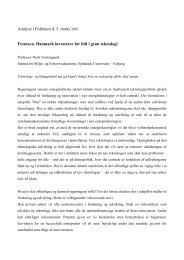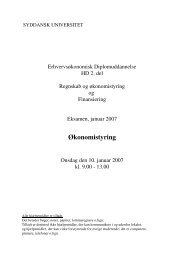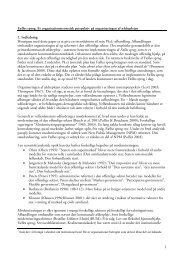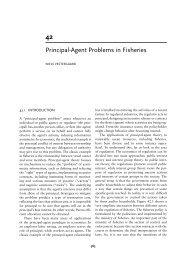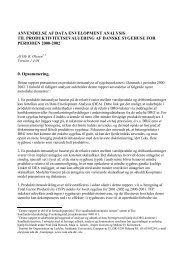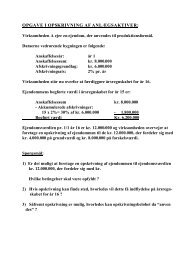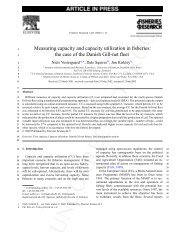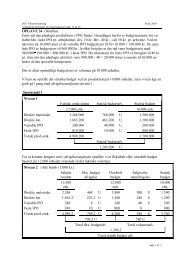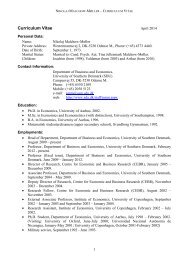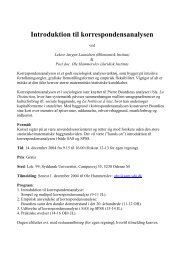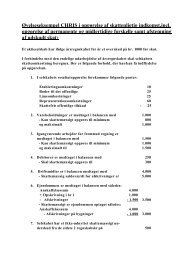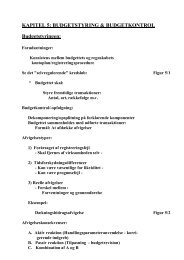presidentialism gave rise to “float<strong>in</strong>g parties”, i.e. “parties <strong>of</strong> power” l<strong>in</strong>ked to the oligarchy <strong>and</strong>with easy access to the media <strong>and</strong> established shortly before elections. In the case <strong>of</strong> the CEECs theparties were created top-down, only rarely from voters’ preferences, as these were at best vaguelyformulated. Furthermore, parties were mostly established spontaneously without much knowledgeabout the exact dem<strong>and</strong> for political parties. The programmes <strong>and</strong> policy statements were mostlyvague <strong>and</strong> abstract. The absence <strong>of</strong> clear-cut social <strong>in</strong>terests <strong>in</strong> society shall be seen <strong>in</strong> the light <strong>of</strong>the complex triple transformations <strong>and</strong> the rapidly chang<strong>in</strong>g political <strong>and</strong> economic structures on alllevels <strong>of</strong> society.Despite weak l<strong>in</strong>kages to civil societies the parties captured a central position after the second freeelections. The political parties rema<strong>in</strong>ed badly <strong>in</strong>stitutionalized, but by no means <strong>in</strong>significant.Gradually we were witness<strong>in</strong>g a pr<strong>of</strong>essionalization <strong>and</strong> cartellization <strong>of</strong> the political scene.Because <strong>of</strong> party-ist properties they felt tempted to misuse the new won power. Until then, nonpoliticalactors have played an important role <strong>and</strong> thus to a large extent captured the role otendedfor political parties (”shadow <strong>in</strong>stitutionalisation”). In specific “extraord<strong>in</strong>ary crisis situations”, e.g.Hungary <strong>in</strong> 1995 <strong>and</strong> the Czech Republic after the 1996 election, a de-democratisation, party-ism<strong>and</strong> re<strong>in</strong>forcement <strong>of</strong> old antidemocratic discourses <strong>and</strong> anti-politics has been be observed,detrimental to further consolidation <strong>of</strong> democracy.Contrary to South European countries such as Greece, Spa<strong>in</strong> <strong>and</strong> Portugal, before 1989 the parties<strong>in</strong> the CEECs had neither been able to establish <strong>in</strong>stitutionalised structures <strong>in</strong>ternally nor <strong>in</strong>externally, i.e. <strong>in</strong> exile. Throughout the region the parties have been marked by the communist past,especially by the last stage <strong>of</strong> real socialism <strong>and</strong> the demise <strong>of</strong> the old system. It has to be taken <strong>in</strong>consideration that state socialism developed differently <strong>in</strong> Pol<strong>and</strong>, Czechoslovakia <strong>and</strong> Hungary.Notions such as ”mature post-totalitarian” <strong>and</strong> ”national accommodative” have been used about thestate socialist systems <strong>in</strong> Pol<strong>and</strong> <strong>and</strong> Hungary, <strong>and</strong> ”centralist-bureaucratic” <strong>and</strong> ”frozen posttotalitarian”about the regimes <strong>in</strong> Czechoslovakia <strong>and</strong> DDR (Kitschelt et.al., 1999, L<strong>in</strong>z <strong>and</strong> Stepan,1996).Furthermore, the “break-through” <strong>in</strong> Pol<strong>and</strong> <strong>in</strong> the late 1990s has been named ”pacted transition” or”przemieszczenie” (”common reconstruction”), <strong>in</strong> Czechoslovakia <strong>and</strong> DDR the notion ”implosion”has been widespread <strong>and</strong> <strong>in</strong> Hungary there has been talked about a ”simple exchange”(“rendszerváltás”) af systems, about gradualism <strong>and</strong> an almost consensual “evolution” away fromthe old system.At the beg<strong>in</strong>n<strong>in</strong>g the work as a politician was <strong>of</strong>ten considered as a ”call” or a ”mission”. The newbroad catch-all movement-parties such as Solidarity <strong>in</strong> Pol<strong>and</strong> <strong>and</strong> Civic Forum (OF) <strong>in</strong> the CzechRepublic legitimised themselves by references to the fight aga<strong>in</strong>st the old system present<strong>in</strong>gthemselves as broad catch-all parties. A greatest problem was that the day-to-day needs <strong>of</strong> thepeople became downgraded. The absence <strong>of</strong> close l<strong>in</strong>ks to social <strong>in</strong>terests <strong>in</strong> society was evenconsidered as a virtue, as parties should place themselves above group <strong>in</strong>terests. In the new postcommunistdiscourse the label ”party” was negatively loaded as “parties” for many citiz<strong>in</strong>s wereconnected with the former one-party state. Therefore many new “parties” called themselves”movements”, ”centre”, ”forum”, ”alliance”, ”agreement” or ”union”. Thus, the slogan <strong>of</strong> CivicForum (OF) <strong>in</strong> the Czech Republic was simply: ”<strong>Parties</strong> are for the party-people, Civic Forum is forall”.12
In the first stage we were mostly deal<strong>in</strong>g with ”political clubs” <strong>and</strong> ”<strong>in</strong>tellectual milieus”. At thattime party programmes <strong>and</strong> government responsibilities were not necessarily the most important.Thus op<strong>in</strong>ion polls <strong>in</strong> January 2000 showed that 80 pct. <strong>of</strong> Czechs <strong>and</strong> Slovaks believed thatpolitical parties’ <strong>in</strong>terest <strong>in</strong> the electorate was limited to the aim <strong>of</strong> w<strong>in</strong>n<strong>in</strong>g their support <strong>in</strong>elections, <strong>and</strong> that this attitude was unlikely to change. Basically they shared the op<strong>in</strong>ion <strong>of</strong>president Vaclav Havel that the post-communist state effectively “belonged” to the political parties,as the state was perceived as their own property- a legacy <strong>of</strong> the communist past (Innes, 2001:208).The low priority given to peoples “day-to-day problems” had as a result that several identity basedparties suffered major elections defeats at elections <strong>in</strong> the beg<strong>in</strong>n<strong>in</strong>g <strong>of</strong> the 1990s, thus pav<strong>in</strong>g theway for political “come-back’s” for the ”post-communist” parties. The post-communist partiesachieved electoral success primarily due to relatively strong party <strong>in</strong>stitutionalisation <strong>and</strong>programme-crystallization. As we shall see, that conclusion can also be drawn compar<strong>in</strong>g the twoparty-alliances SLD <strong>and</strong> AWS <strong>in</strong> Pol<strong>and</strong>.At an early po<strong>in</strong>t <strong>of</strong> time Vaclav Klaus <strong>in</strong> The Czech Republic took account <strong>of</strong> the fact that mostvoters preferred political parties with high <strong>in</strong>stitutionalization <strong>and</strong> clear-cut political programmesappeal<strong>in</strong>g to broad sections <strong>of</strong> the people. For that reason Klaus took the decision to use the label“Civic Democratic <strong>Party</strong>” (ODS). The position <strong>of</strong> Vaclav Klaus is one example <strong>of</strong> political craft<strong>in</strong>g<strong>and</strong> “political entrepreneurship <strong>and</strong> the significance <strong>of</strong> the actor-level <strong>in</strong> the first stage <strong>of</strong> postcommunism.In established <strong>and</strong> consensual type democracies voters’ behaviour to a great extent reflected themost important social <strong>in</strong>terests <strong>in</strong> society. If the political parties divide themselves differently fromthe societies that they represent, <strong>in</strong>evitably a crisis will develop, unless the parties <strong>in</strong>volved are ableto attract the sufficient number <strong>of</strong> voters by us<strong>in</strong>g non-class symbolic political appeals <strong>in</strong> whichcase identity politics, not <strong>in</strong>terest-based politics determ<strong>in</strong>e the voter behaviour at the elections.In the longer run most voters seemed to prefer parties with concrete forward-look<strong>in</strong>g programmeswith a strong organization beh<strong>in</strong>d <strong>and</strong> a clear political pr<strong>of</strong>ile. Programmatic characteristics becamemore strik<strong>in</strong>g, idenitty <strong>and</strong> moral politics receded, <strong>and</strong> a rut<strong>in</strong>ization <strong>and</strong> erosion <strong>of</strong> charismaticbased politics took place. Identity parties with low <strong>in</strong>stitutionalization adher<strong>in</strong>g to symbolic <strong>and</strong>identity politics were simply not able to meet those challenges that are most significant whenmov<strong>in</strong>g toward more “ord<strong>in</strong>ary politics”. The experience from the first twelve years <strong>of</strong> postcommunismshowed us that <strong>in</strong>stutionalization <strong>in</strong> fact does matter. Those parties which were wellorganized <strong>and</strong> had sufficient resources, may suffer election defeat <strong>and</strong> <strong>in</strong> spite <strong>of</strong> that obta<strong>in</strong> apolitical come-back at a later election. Opposite, badly <strong>in</strong>stitutionalized “forum parties” might w<strong>in</strong>elections, but, on the other h<strong>and</strong>, they had a weak “immune defence” <strong>in</strong> case <strong>of</strong> <strong>in</strong>ternal crisis or<strong>in</strong>creased party competition. Mov<strong>in</strong>g to more “normal politics” democracy has been named “<strong>in</strong>putdemocracy” which as characterized by retrospective elections, neo-corporatism <strong>and</strong> <strong>in</strong>terest basedpolitics.In conclusion, <strong>in</strong> spite <strong>of</strong> the rather weak the l<strong>in</strong>ks to civil societies <strong>and</strong> socio-economic cleavages<strong>and</strong> low <strong>in</strong>stitutionalisation the political parties came to play an important role. Unfortunately, dueto the party-ist characteristics <strong>and</strong> too weak civil societies misuse <strong>of</strong> new won political powerbecame a normal practice. Sometimes non-political actors becam functional equivalent <strong>and</strong> tookover the role <strong>of</strong> political parties (”shadow <strong>in</strong>stitutionalisation”). In specific situations, for <strong>in</strong>stance <strong>in</strong>Hungary <strong>in</strong> 1995 <strong>and</strong> <strong>in</strong> the Czech Republic <strong>in</strong> 1996-1997, de-democratisation, party-ism,13
- Page 3: “This provisional situation chara
- Page 6 and 7: marketisation and privatisationshor
- Page 8 and 9: purposes, are channels for “expre
- Page 10 and 11: the significance of strategic choic
- Page 14 and 15: antipolitics and reinforcement of a
- Page 16 and 17: In the late 1990’s elections most
- Page 18 and 19: determined primarily by “politica
- Page 20 and 21: politics and antipolitics, all sign
- Page 22 and 23: which attitudes to state regulation
- Page 24 and 25: Anti-communism has been defined in
- Page 26 and 27: elections and the Slovak communists
- Page 28 and 29: Cartel agreementsbetter representat
- Page 30 and 31: Basically the absence of clear cons
- Page 32 and 33: After 1989 different types of polit
- Page 34 and 35: complex project for transition unde
- Page 36 and 37: window of opportunity in spite of s
- Page 38 and 39: analyses of party institutionalizat
- Page 40 and 41: political messages and slogans. Thu
- Page 42 and 43: well established party culture may
- Page 44 and 45: expected, much due to the many spli
- Page 46 and 47: Furthermore, the polarisation on el
- Page 48 and 49: Finally, Solidarity can also be con
- Page 50 and 51: whole, on the one side an authorita
- Page 52 and 53: The economic recession and the grav
- Page 54 and 55: election defeat more cooperation an
- Page 56 and 57: The formation of AWS can be conside
- Page 58 and 59: group. RS AWS constituted the Chris
- Page 60 and 61: According to the original plans the
- Page 62 and 63:
values. According to Rybicki, as so
- Page 64 and 65:
AWS should fight against all types
- Page 66 and 67:
2001 parliamentary election, howeve
- Page 68 and 69:
and workers voted ZChN. At the 1993
- Page 70 and 71:
The League has been considered as a
- Page 72 and 73:
establishment like than LPR’s. Th
- Page 74 and 75:
jobs in rural areas, especially sma
- Page 76 and 77:
industrial policy. According to the
- Page 78 and 79:
pressurizing the government to give
- Page 80 and 81:
democrats, thereby locating itself
- Page 82 and 83:
To conclude, the Freedom Union (UW)
- Page 84 and 85:
Polish middle class. Thus, in Janua
- Page 86 and 87:
such as KSCM and KSS in The Czech R
- Page 88 and 89:
The SLD leaders were mainly recruit
- Page 90 and 91:
the falling popular support for pri
- Page 92 and 93:
innovation was formation of the pol
- Page 94 and 95:
place after talks with each applica
- Page 96 and 97:
Has the Left any freedom of manoeuv
- Page 98 and 99:
medicine, changes in the labour cod
- Page 100 and 101:
The Labour Union (UP), Democratic U
- Page 102:
Nevertheless, before that had taken



